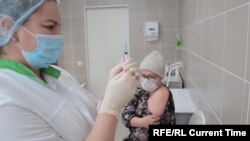Ongoing clinical trials for Russia’s Sputnik V vaccine and reported production snags have raised questions about how easily its campaign to vaccinate people across more than 17 million square meters of territory might be accomplished.
But in two regions visited by Current Time in that vast expanse, some of the first individuals to be vaccinated – all public employees -- expressed only confidence in the vaccine drive.
“As they say, we believe the state,” commented Sergei Vasiliyev, a smiling physical-education teacher waiting to be vaccinated in a public hospital in Ufa, a city of roughly 1.12 million people just west of the Ural Mountains.
On December 14, the Kremlin announced that all 85 of the country’s constituent parts had received the Sputnik vaccine to start immunizing medical professionals, teachers, and social-welfare workers – those considered at highest risk for exposure to the virus.
But the vaccinations will slowly expand. Aleksandr Gintsburg, director of the Ministry of Health’s Gamaleya National Research Center, which developed Sputnik V, has estimated that 70 percent of Russia’s population of over 146.7 million people will need to be vaccinated against the coronavirus to halt its spread.
Gintsburg named November 2021 as the target deadline for that task.
Much of the responsibility for reaching that goal depends on a company called Immunotechnologies. Set up in May by the state-run Sberbank, the firm is singlehandedly overseeing the nationwide distribution and sale of the vaccine, a source in Russia’s Health Ministry told Forbes.ru.
Estimates vary widely, but Moscow, the pandemic’s hub, with nearly 698,100 cases to date, appears to have received the bulk of the vaccine doses produced to date in Russia.
Amounts received outside of Moscow to start the regional vaccination campaign can range from 200 doses in the western city of Kaliningrad to 1,000 doses in the Siberian city of Novosibirsk, Meduza reported on December 12.
Two time zones to the east of the Russian capital, the region of Bashkortostan reported receiving 1,900 doses of the Sputnik V vaccine on December 14.
The delivery is the third for this primarily Turkic region of over 4 million people. The regional government expects yet another delivery before the end of 2020, local state-run television reported.
But what percentage of these deliveries are made up of the final, crucial dose in the two-dose round of immunizations is unclear.
Independent and foreign media have reported that Russian production facilities cannot manufacture enough of the second doses, which have a different composition from the first.
Hospital No. 21 in Ufa, Bashkortostan’s main city, does not appear to have a surplus of either dose.
As of December 9, it had received 60 doses with which to vaccinate 50 hospital workers and 10 employees of educational institutions located in the hospital’s neighborhood, said Marat Sharafutdinov, the hospital’s deputy chief physician.
That number suggests that the final doses had not yet arrived.
Overall, the region has recorded 16,317 coronavirus cases since the pandemic’s start in March – just over 2 percent of Moscow’s tally.
In Moscow, some medical workers told the Alliance of Doctors, an independent professional union, that city-funded polyclinics had threatened them with dismissal if they were not vaccinated.
But interviewed public employees did not report any such pressure in Ufa.
“Literally this week, they told us that we could get a vaccine, and we, along with our colleagues, were among the first to sign up,” related IT instructor Yelena Zapolskikh.
Some 1,200 kilometers further to the east, Kemerovo Oblast had set aside about 27 percent of its stockpile of 1,000 vaccine doses for individuals in the current top-priority group as of December 9.
With a population of some 2.6 million people, the region has recorded 23,200 cases since the pandemic’s start – 3.3 percent of Moscow’s rate.
Yet despite a higher regional infection rate than in Bashkortostan, Kemerovo appears to have received fewer vaccine doses (1,000) for the initial round of vaccination.
The Kemerovo Clinical Diagnostic Center in the regional seat, Kemerovo, reported having just 27 doses of Sputnik V on December 9. If this number included both doses, that would mean fewer than 14 patients could be vaccinated.
The Center’s deputy chief physician, Olga Alekhina, believes more doses will come, however. The government has promised that the next shipment would be “more massive,” Alekhina said.
Nurse Olga Skripachenko was one of the first people to be vaccinated at the Center.
“I think that there aren’t any people among our workers who wouldn’t like to be vaccinated,” Skripachenko said. “But there are those who are doubtful, those who are nervous.”
Anesthesiologist Vasily Zhdanov said he fears no side effects from the vaccine. So far, no severe adverse responses have been reported.
“I consider that the biggest risk of this vaccine is that it just won’t work,” Zhdanov said. “This is a vector vaccine. There isn’t any of the virus there at all – either alive or dead.”
The Sputnik V site itself states that the virus, or vector, in the vaccine is used simply “to transport genetic material” from the COVID-19 virus without duplicating itself.
Though testing is not complete on the vaccine, the site, developed by the Russian Direct Investment Fund, describes the vaccine as “extremely safe” and 95-percent effective.
But in a December 8 interview with the state-run Rossiiskaya Gazeta, Gamaleya National Research Center Director Gintsburg cautioned that destroying the COVID-19 virus completely is “fundamentally impossible.”
As an infection caused by a biological agent, the virus can be passed not only between humans, but also animals, Gintsburg noted.
Only after Russia has vaccinated 70 percent of its population, he said, “will we have the scientific grounds to say, think, and consider that the given process (the pandemic) is really under control.”






